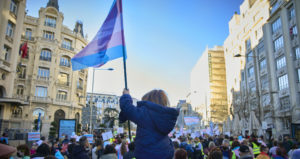In 2007, I spent time in Blackpool investigating the disappearance of Charlene Downes, a 14-year-old whose body has never been found. She was one of hundreds of girls in the town targeted by sexual predators who would groom and then rape their victims before pimping them to multiple men in exchange for alcohol, cigarettes and food.
During my investigation, I accompanied police officers to an amusement arcade where Charlene had been last seen. The detectives were looking out for any of the men under suspicion for her disappearance. During that two hour visit, over 30 convicted male sex offenders were later identified from CCTV footage. That’s one premises, in one night, in one town.
Blackpool, one of the most deprived parts of England, is rife with child abuse and home to a higher number of convicted child sex offenders than anywhere else in the country. It is thought that predatory men gravitate there to seek out vulnerable children. They don’t have to look far — there are three times the national average of children in care in Blackpool.
The sex trade – both legal and illegal – is rife. The proliferation of lap dance clubs and bars catering to groups of men on stag weekends has given the town a reputation as a haven for sex tourists. Queen Street, which is a focus for Blackpool’s night life, has also seen an increase in underage prostitution. Last year there were 87 visits by police and local authority inspectors to premises where children were believed to be sexually exploited.
Lisa* is a serving police officer in Blackpool and tells me that the town is known as a “safe haven for nonces”.
“They come out of prison and come here,” Lisa tells me. “They know they’ll get a friendly reception in a place jam packed with vulnerable children, and barely any support from social services.” It would be hard to deny that Blackpool can be a miserable place for children, particularly those in low-income families, to be raised.
But there is one thing I didn’t know about Blackpool, which I learned from listening to Inside the Gender Clinic, a podcast about the much maligned Gender Identity Development Service (GIDS) at the Tavistock. The majority of referrals to the clinic are not, as one might assume, from the South, or from Brighton, but from Blackpool. This is surely the last place you’d expect to see so many trans-identified children. After all, the voices we so often hear on this issue in the media tend to belong to upper middle-class kids raised in liberal families.
So why might this be so?
Claire*, who grew up in Blackpool, is working for a charity that supports female victims of male violence. She tells me that the links between the rise in young females being referred to gender identity clinics and the realities of growing up in places like Blackpool are obvious. She cites high levels of poverty and the normalisation of the exploitation of women and girls in the sex trade.
As a child, Claire, who was raised in Blackpool, was subject to men’s violence and consequently wanted to “opt out of girlhood”. She says: “The option to be removed from the harms of men would be appealing to most survivors. I am furious that we are allowing girls who need care and support to go down irreversible paths.”
I have long argued that the majority of girls presenting as gender dysphoric have experienced childhood trauma. What if the availability of breast binders, puberty blockers and instant affirmation as trans is a handy way for traumatised sexual abuse victims to dissociate from the abused body?
One study, published back in 1994, looked at the issue of transsexualism and the connections with dissociation and child abuse. It found that of the 45 female to male transsexuals interviewed, more than 60% reported one or more types of severe child abuse. The sample group also disclosed symptoms and responses that are known to be typical effects of child abuse, such as fear, anxiety, depression, eating disorders, substance abuse, aggression and suicidal thoughts. The author suggests that transsexualism “may be an adaptive extreme associative survival response to severe child abuse”.
Kirsty Entwhistle is a former GIDS employee who turned whistleblower in 2019 when she wrote an open letter to Polly Carmichael, head of GIDS. Entwhistle was a clinical psychologist at the Leeds GIDS clinic between 2017 and 2018 and was struck by the similarities between some of the disturbed young girls who were demanding puberty blockers with those she had encountered while working in a children’s home in Rochdale in 2003.
Entwhistle became aware that some of the girls were being sexually abused and pimped by gangs of men in what became known as the “Rochdale grooming gang scandal”. At GIDS, she saw much of the same behaviour from some of the girls presenting as trans and demanding puberty blockers, with some threatening to harm themselves if they were refused hormones.
She said: “I knew that the kids would harm themselves to access something that is actually harmful to them. Just because a young person kicks and screams and tries to burn the house down, doesn’t mean it’s the right thing for them.”
Female to male trans teenagers from Blackpool interviewed for the podcast on GIDS speak of teachers giving young girls breast binders without the knowledge of their parents; of a GP prescribing testosterone to a teenage girl who hadn’t even been seen by a counsellor or attended the gender clinic; and a school support worker who helped a young girl change her name by deed poll to that of a boy.
In Blackpool, local LGBT+ support services have been given funding specifically to work with “trans children’ as young as 10. UR Potential runs, Butterfly Trans Youth for ‘LGBTQ+ and non-binary young people’ in Blackpool, plus a trans-only young people’s group.
In June 2016, UR Potential CEO Linda Markey said: “We are receiving more and more referrals about transgender young people from schools, colleges and organisations who work with young people. Some young transgender people are as young as 12. Schools are struggling to meet the demand for support and staff need specific training.”
Many professionals responsible for child protection, such as teachers, counsellors and social workers, seem to be keen to offer support to young people with gender dysphoria, but what of the sexually abused girls? What is happening to protect them from this tsunami of male violence? Could it be that for many abused and neglected girls, presenting as transgender can be a form of attention seeking and validation?
Until recently, Norma* was a secondary school teacher in Blackpool. She tells me she saw transgender ideology creeping in among young girls: “I tried to raise the alarm of the potential harms surrounding gender non-conforming young women and girls to safeguarding leads. This was met with naivety of the realities of the situation and their insistence on using ‘he/him’ pronouns with no scrutiny as to any other issues.”
At one Blackpool school, several students in three consecutive years transitioned around the same time; while kids need support in dealing with the distress of gender dysphoria, immediately affirming them as the opposite sex is not helping.
Abused, damaged and traumatised girls have long self-harmed by cutting or starving themselves in an attempt to escape their bodies. Hadley Freeman has written eloquently about the glaringly obvious links between teenaged girls’ trauma and trans identification. So why are these agencies and charities so ready to suggest puberty blockers rather than properly scrutinising what makes a teenager believe she’s a boy?
Blackpool seems to offer a clear example of how vulnerable, damaged children are being drawn to gender ideology because it offers a “one stop shop” solution to the pain of living as a female in a hellish world of abuse. “These girls have been horrifically betrayed,” says Norma. “Why are we sending them for irreversible, damaging treatment, when what they need is protection from sexual violation and abuse?”
Disclaimer
Some of the posts we share are controversial and we do not necessarily agree with them in the whole extend. Sometimes we agree with the content or part of it but we do not agree with the narration or language. Nevertheless we find them somehow interesting, valuable and/or informative or we share them, because we strongly believe in freedom of speech, free press and journalism. We strongly encourage you to have a critical approach to all the content, do your own research and analysis to build your own opinion.
We would be glad to have your feedback.
Source: UnHerd Read the original article here: https://unherd.com/





